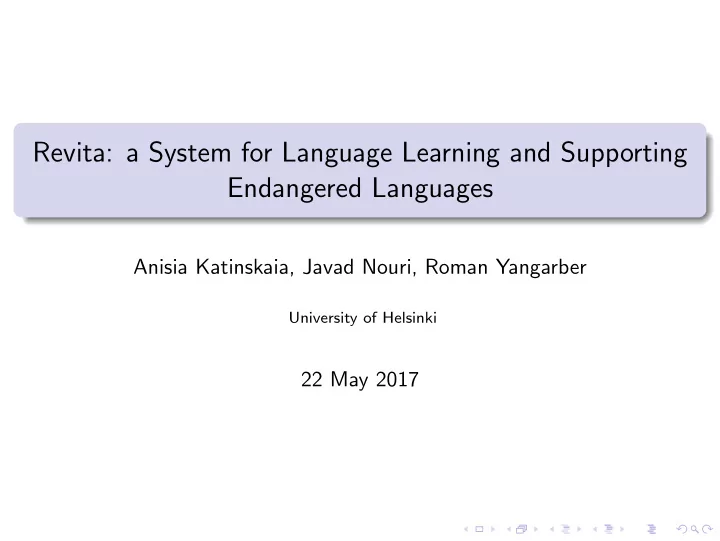

Revita: a System for Language Learning and Supporting Endangered Languages Anisia Katinskaia, Javad Nouri, Roman Yangarber University of Helsinki 22 May 2017
Introduction Computer Science Department, University of Helsinki Research group in Computational Linguistics Academy Project: a computational tool for language learning ... for supporting less-resourced, endangered languages
Revita project Specific aims: Tools to help user improve competence in language → not aimed at beginners: intermediate/advanced levels endangered languages: Erzya Meadow Mari Udmurt Komi-Zyrian North Saami Sakha Other uses emerged: Swedish, Finnish, Russian. Other languages can be added.
Main ideas and features Stimulate active learning by providing: exercises for active language production possibility to upload stories interesting to the user → unlimited supply of exercises, because they are generated automatically → exercises based on learners’ answers given so far Grammar and vocabulary practice Multiple-choice and ’cloze’ quizzes, crosswords, and flashcards.
Main practice mode Choose a text to practice Present pieces of text (snippets) to the student in order Several words in the snippet will be chosen for quizzes Multiple-choice quiz: selected words are presented with distractors ’Cloze’ quiz: selected words are removed, base forms (lemmas) are presented as hints Student’s task: guess the correct form of the word—based on lemma and context of the story
Example of exercise “Topelius kertoo Maamme kirja eri maakunnista” ( “Topelius tells book Our Land about the different provinces.” ) “Topelius kertoo Maamme kirjassaan eri maakunnista” user will receive immediate feedback about answers correct form = form found in the story
Crosswords, translation and flashcards Student can get a translation of any word in the current snippet All words that the student has clicked to get translations are saved to flashcards Crosswords: 40-50 words from story are used to generate a crossword user can request additional hint for missing words, which are their grammatical base forms (lemmas)
Generating exercises Pipeline of generating an exercise from a loaded story: tokenize text, extract title, analyze by morphological analyzer; extract base forms, parts of speech, grammatical tags from analyses; extract from text all words and combinations of words that can serve as candidates for exercises;
Ambiguous words A surface form is considered ambiguous if it has more than one different lemma. Russian form “жил” has two morphological bases: “жить” (live-INF, “to live” ) “жила” (sinew-NOM.SG, “sinew” ). In both cases forms “жил” have two different analyses: “жил” (live-PST.MASC.SG, “he lived” ) “жил” (sinew-GEN.PL, “sinew” ).
Word combinations as candidates for exercises Combinations of words are chosen by Revita based on language-specific rules. [pos=adj, case=X, number=Y, gender=Z] [pos=noun, case=X, number=Y, gender=Z]; [word= в , pos=prep] [pos=noun, case=loc or acc]. Examples of combinations derived by these rules: "красивой девушке" beautiful-Fem.Dat.Sg girl-Fem.Dat.Sg ”... [to] a beautiful girl (dative)” "в доме" in house-M.Loc.Sg ”In a/the house”
Choosing candidates Revita uses history to compute weights for exercise candidates. Examples always answered correctly by the learner receive low probability; examples sometimes answered correctly and sometimes incorrectly receive high probability; examples that were never answered correctly receive lower weight; Revita computes the proximity of the candidates within the snippet randomness is applied when choosing from the final set of weighted candidates.
Code-switching disambiguation Surface form “пота” can be Russian or Komi. Komi: first-person singular indicative of verb “потны” (“to crack”) Russian: genitive singular of the noun “пот” (“sweat”)
FU-Russian disambiguation for all words w with both Russian and FU analyses; look through the text and check whether w has “friends” : whether its lemma is equal to the lemma of some other surface form y in the text. All words without friends are discarded as “risky” If w has FU friends in the story, it is highly likely to be a FU word. If w has friends, examine its “neighbors” The word is again discarded as “risky” if it has at least one immediate neighbor with a Russian analysis. → The accuracy obtained for Russian and Udmurt was 0.77
Future work refine scoring system; add the possibility for collaboration to the system; assessment of uploaded stories by their difficulty for the learner, and their quality as learning material; accepting forms which are not the same as used by the author, but are allowed by the context progress assessment, which is important for developing new exercises
Demo ... revita.cs.helsinki.fi
Thank you!
Recommend
More recommend